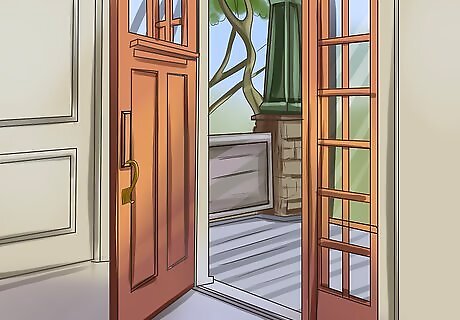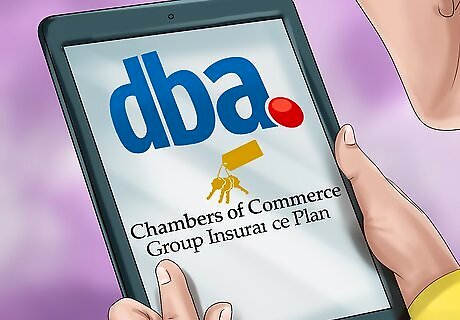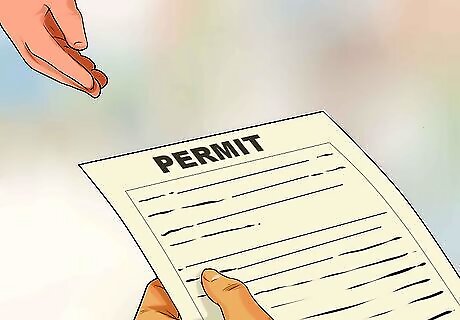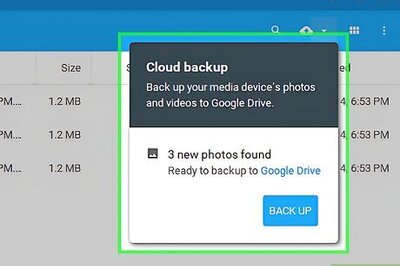
views
Complying with Zoning Requirements

Contact your local zoning office. Your city or town is probably zoned for different uses. Some areas will be residential and others will be zoned for commercial or “mixed” use. Before starting your business, you need to check whether your home-based business is prohibited by zoning laws. Generally, zoning laws might allow some businesses but not others in residential areas. Stop into your local or city planning office and ask for a copy of the zoning rules. If you have questions, then ask them at the office. If you violate the zoning laws, your business will be forced to shut down and you will probably be fined. Accordingly, you can’t skip this important step.

Avoid changing your home’s appearance. Most zoning codes prohibit you from changing your home because you have started your home-based business. For example, most zoning codes will prohibit the following: You can’t change the exterior physical appearance for the purpose of conducting business. You will be limited in your outside business activities, displays, or storage. You can’t use business signage or commercial vehicles around your home.

Follow traffic restrictions. Your zoning code will also put restrictions on the amount of foot traffic to and from your business. The code seeks to maintain the residential character of your zone, so you will probably be limited in the following ways: The zoning code will restrict the number of visitors to your home-based business. The code will restrict the number of employees working in the home and might even prevent any employees from working there. The zoning code might restrict business parking or require additional business parking.

Avoid making nuisances. The zoning code will also strictly limit activities so that you don’t become a nuisance to your neighbors. Accordingly, the code could restrict: The code will restrict nuisance impacts, including noise, glare, odors, etc. The code will restrict or prohibit your home use or storage of hazardous materials.

Check with your Homeowner’s Association. If you belong to an HA, then you will also have to abide by your HA’s bylaws. You should already have a copy of your bylaws. Take them out and read them. Check for any limitation on home-based businesses. If you don’t have your copy of the bylaws, then check with the executive board for the Association.
Forming Your Business

Decide on the corporate form. Your business could take one of many different forms. You should think about the pros and cons of each form before forming your business. The most common business forms are sole proprietorships, limited liability companies, corporations, and partnerships. Sole proprietor. This is the easiest to form. When tax season rolls around, you simply file Schedule C along with your 1040 form. Other corporate forms will require filing separate business tax returns. However, as a sole proprietor, you are personally liable for any debts or decisions made by your business. For example, if your business takes out a $10,000 loan, you are personally responsible for that business loan. Also, if your business is sued, then you could be personally liable for the amount. Limited Liability Company (LLC). With an LLC, you are shielded from personal liability for any debts or damage caused by your business. In some states, you can incorporate as an LLC if you have only one member. Other states will require two or more members. Corporation. This is the most complicated business form and requires the most time and money to set up. The corporation is owned by shareholders, who are personally shielded from corporate liability. Partnership. A partnership is a business where two or more people share ownership. Partners are personally liable for the decisions and debts of all partners. Accordingly, some states have created Limited Liability Partnerships (LLPs), which will shield partners from personal liability.

Complete the required paperwork. If you form an LLC or corporation, then you will need to file certain paperwork with your state. You can get the forms from your state’s Secretary of State’s website or an equivalent office. To form a sole proprietorship, you don’t need to file a form. For example, if you are a freelance writer, you are automatically a sole proprietor of your writing business. To form an LLC, you will need to complete and fill out your “articles of organization,” which might also be called a “certificate of formation” or “certificate of organization.” To form a corporation, you will need to complete “articles of incorporation.” To form a partnership, you generally don’t need to fill out any paperwork. Instead, you and the other partners need to agree to form a partnership. This agreement could be oral, though it should be in a written partnership agreement.

Pay your fee. When you file your required forms with the state, you typically have to pay a fee. You should check with the Secretary of State’s office ahead of time and ask for the amount and acceptable methods of payment.

Draft your operating agreement. You generally do not need to file an operating agreement, bylaws, or partnership agreement with your state. However, they can be very helpful to draft whether you are running an LLC, a corporation, or a partnership. By drafting these documents, you force yourself to think about your business goals and structure. Your operating agreement will typically discuss the following: The purpose of your organization, i.e., what your business hopes to accomplish. The ownership of the business. If owners do not own the business equally, then your agreement will outline the percentage each owner holds. How often meetings will be held. If you are a corporation, then you will need to designate officers and board members. Decide how often they meet. How profits are distributed and how much each owner is entitled to. How the business can be dissolved and what happens to the business if one or more people exit.

Request an Employer Identification Number. You use this number to identify a business entity for tax purposes. If you run a sole proprietorship, then you generally don’t need an EIN. All other businesses will. Even sole proprietors can apply for an EIN, which is free. You can apply online by visiting the IRS website. It takes about 15 minutes to complete the application, and you must complete it in one sitting.
Getting Required Licenses and Permits

Get a home occupation permit. Ask your local zoning board if you need to get this permit. Not every city or county requires that you do; however, some might require that you get a home occupation permit, depending on your business.

Apply for a general business license. Your city or county will require that you get a business license for a fee. You should visit their website and check to see how to apply. Often, you can apply for the license online.

Get sales tax permits. You will need this if you sell taxable goods, either online or offline. Some states don’t require sales tax. Nevertheless, if you sell to states which do charge a tax, then you will still need to get a permit. You can get a sales tax permit from your state’s Department of Revenue or Comptroller’s office. To find your state’s office, type “sales tax permit” and your state into an Internet search engine.

Register your business name. You need to register a business name if you intend to use any name for your business other than your own. For example, if you want to use “John A. Smith and Associates,” then you need to register a business name. You first need to see if your business name is available. You should visit your Secretary of State’s website, which should have a database you can search to see if your name has been taken. See Set Up a DBA for more information.

Get occupational licenses or permits. Depending on your business, you might need additional licenses or permits. For example, if you want to be a hairdresser, then your state might require that you have a license. The Small Business Administration’s website contains links to each state and the District of Columbia. The links will take you to the state website where you can find out what licenses or permits you need for your occupation. Remember to get all licenses and permits before opening your business, otherwise you are operating the business in violation of your state’s laws.



















Comments
0 comment